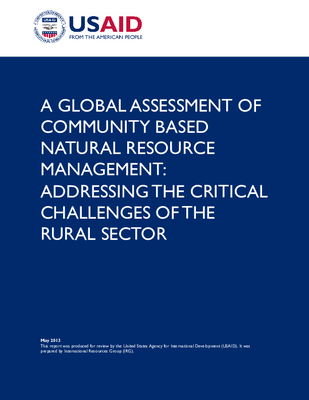A Global Assessment of Community Based Natural Resources Management: Addressing the Critical Challenges of the Rural Sector

Author(s): Anderson, Jon, Mehta, Shreya
Publication Date: 2013
Location: Africa: Kenya, Madagascar, Namibia, Senegal. Latin America: Guatemala. Asia: Cambodia, Nepal.
DOWNLOAD FILECBNRM: An assessment with recommendations for the future. Rural development issues are critical not only for the rural areas themselves but also for addressing pressing global concerns of food security (FS), climate change, biodiversity conservation, poverty reduction, provision of environmental goods and services, and good governance.
Key points in document
- The purpose of the assessment is to review the state of community-based natural resource management (CBNRM) and offer guidance to improve CBNRM program design and implementation.
- Many of the enabling conditions for CBNRM are related to supporting conservation enterprises. Conservation enterprises are often based at the community level.
- Information for the assessment was gathered through conference participation, visits to project sites in Cambodia, Guatemala, and Kenya, and an extensive literature review.
- The assessment uses the Nature, Wealth, and Power (NWP) framework to determine the enabling conditions for successful CBNRM, including conservation enterprises.
- Community partnerships with national governments and private sector organizations are critical to the success of CBNRM.
- The document goes into great detail on various constraints and enabling conditions related to CBNRM projects.
- The document provides lessons for CBNRM related to “special issues” including national level processes, governance, food security, vulnerable groups, and climate change. These each offer insights on how to approach enabling conditions that will address the “special issue.” For example, addressing climate change with CBNRM projects requires the support of improved technical skills, financial skills, and governance capacities.
Topics addressed in document
Information relevant to Learning Questions:
Are enabling conditions in place to support a sustainable enterprise?
- Stakeholder alignment
- Market demand, profit potential
- Governance
- Policies for enterprises, business alliances
- Technical capacity
- Inputs
- Benefit sharing, policies for and enforcement of resource use
Does the enterprise lead to benefits to stakeholders?
- Increased income for participants
- Non-cash benefits
Do the benefits lead to positive changes in attitudes and behavior?
- Attitudes regarding sustainable use of resources
- Behaviors regarding sustainable use of resources
Does a change in stakeholders’ behaviors lead to a reduction to threats to biodiversity (or restoration)?
- Energy production and mining
- Biological resource use
- Human intrusions and disturbance
- Climate change and severe weather
Does a reduction in threats (or restoration) lead to conservation?
- Forest ecosystems


